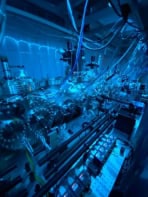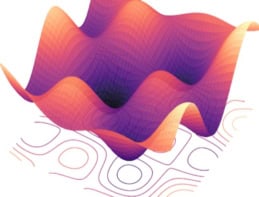
The 2010 Wolf Prize in Physics has been awarded to Alain Aspect, John Clauser and Anton Zeilinger “for their fundamental conceptual and experimental contributions to the foundations of quantum physics, specifically an increasingly sophisticated series of tests of Bell’s inequalities, or extensions thereof, using entangled quantum states”.
The trio will share the $100,000 prize, which will be presented by the President of Israel at the Israeli parliament (Knesset) on 13 May 2010. Zeilinger, 64, is at the University of Vienna, Austria; Aspect, 62, is at the Institut d’Optique in Palaiseau, France; and Clauser, 67, is at J F Clauser and Associates in Walnut Creek, California.
The winners were involved in three pioneering experiments that established the quantum property of entanglement – whereby two or more particles display much stronger correlations than are possible in classical physics. Entanglement plays an important role in quantum computers, which in principle could outperform conventional computers at some tasks.
Violating Bell’s inequality
All three experiments measured violations of Bell’s inequality, which places a limit on the correlations that can be observed in a classical system. The first was done in 1972 at the University of California at Berkeley by Clauser and Stuart Freedman, who measured the correlations between the polarizations of pairs of photons that are created in an atomic transition. They showed that Bell’s inequality was violated – which meant that the photon pairs were entangled.
There were, however, several “loopholes” in this experiment, making it inconclusive. It is possible, for example, that the photons detected were not a fair sample of all photons emitted by the source (the detection loophole) or that elements of the experiment thought to be independent were somehow causally connected (the locality loophole).
In 1982 Aspect and colleagues at the Université Paris-Sud in Orsay, France, improved on Clauser and Freedman’s experiment by using a two-channel detection scheme to avoid making assumptions about photons that were detected. They also varied the orientation of the polarizing filters during their measurements – and in both cases Bell’s inequality was violated.
Closing the locality loophole
The locality loophole was closed in 1998 by Zeilinger and colleagues at the University of Innsbruck, who used two fully independent quantum random-number generators to set the directions of the photon measurements. This meant that the direction along which the polarization of each photon was measured was decided at the last instant, such that no signal (which by necessity has to travel slower than the speed of light) would be able to transfer information to the other side before that photon was registered
The Wolf Prize is awarded by the Wolf Foundation in Israel and is often thought to be the most prestigious prize in physics after the Nobel prize. The foundation was created in 1975 by Ricardo Wolf, a German-born inventor and diplomat.



